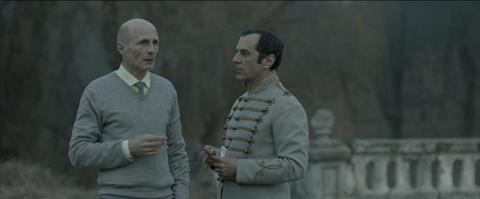Dir/scr: Alexey German Jr. Russia-Ukraine-Poland 2015. 130mins

A dense, sprawling, melancholy, angry parable that deploys seven interconnected stories to probe the diseased soul of contemporary Russia, Alexey German Jr’s new film is a fragmented tour de force, a ravishingly shot, thought-provoking triumph of non-linear filmmaking. Slowly assembling its cinematic mosaic piece by piece, and saturated with references to Russian history, politics, art, literature and social issues, it demands commitment of its audience; in comparison another recent Russian masterpiece, Andrey Zvyagintsev’s Leviathan, plays like an action movie. But once you surrender to the film’s slow dance it becomes strangely mesmerising.
German mixes story and parable with masterful ease, sometimes with Slavic gloom, sometimes with wry humour.
Not an easy sell outside of Russia and the former Soviet republics, or inside them for that matter, Under Electric Clouds should nevertheless trickle down, after further festival play, to patient and curious theatrical audiences worldwide with an appetite for challenging, innovative filmmaking.
An on-screen prefatory quotation from Cezanne about drawing being not about line or modeling but about “a relationship of contrasts” prepares us for the impressionistic narrative style of what will follow. The year is 2017, a voice-over narrator tells us, a hundred years on from the Russian Revolution, in a country “crucified between past and present”. The story we are about to watch will be about “special people – those who used to be called superfluous”, and “an unfinished building”.
That building – a sort of poor man’s Burj al Arab, a sail-like skyscraper abandoned after its structural core was erected – is in the background of all the film’s seven stories, or chapters. It’s there literally, looming in the out-of-focus distance, and it’s there, we gradually realise, as the common denominator that connects the seven characters or groups of characters we will meet.
There’s a ghettoblaster-toting Kyrgyz construction worker who speaks not a word of Russian, a brother and sister who are the heirs of the now disgraced (or politically framed) oligarch who commissioned the building; there’s a real estate lawyer who is troubled by a recurring dream, a multilingual guide (Ninidze) in historical dress who works in a state museum that is threatened by the redevelopment of the area, a twelve-year old girl who is taken hostage by a group of Mafiosi, and the white elephant’s architect (Franck) who, we are told, tried to set himself on fire when they stopped construction, but failed because the matches were wet.
It’s only towards the end of the film’s over-two-hour running time, as the final chapter returns to Sasha (Korotkova), the oligarch’s daughter– the one character who, in her refusal to sell her father’s land, represents some slim hope for the future – that the connections begin to fall into place. But don’t expect a multi-linear narrative à la Magnolia or Short Cuts; the scraps of story we’re given seem to inhabit a space somewhere between reality and dreamspace, a sort of Tarkovskian Zone – except rather than fulfilling our innermost desires, this Zone holds a distorting glass up to Russia past and present, to the country’s aspirations and failures, to its great works and petty preoccupations.
By the same token – as in the director’s previous film, the lyrical cosmonaut drama Paper Soldier (2008) – characters talk at cross-purposes, holding conversational monologues, splitting and fusing like atoms as the camera circles slowly around them. Shot in winter, the film’s queasily unplaceable locations include the backlot of a former film studio now littered with prop statues of, among others, Lenin, and a snowy nearby beach that may give onto a lake, or a sea, or simply a watery wasteland.
But just as things are feeling a little too abstract, too theatre-of-the-absurd, German engages us with moments of real drama: a drug addict who attempts to save the hostage girl, Sveta, is beaten up and then shot by the bad guys; Sasha discovers that the horses in the stable of her father’s villa – where a useless domestic robot glides incongruously from room to room – have starved or, possibly, been poisoned.
German mixes story and parable with masterful ease, sometimes with Slavic gloom, sometimes with wry humour – as when the film’s title is made explicit in a shot of an advertisement projected onto the clouds. Themes touched on along the way include attitudes towards immigrants, anti-Semitism, drug abuse, the manipulation of the judiciary for political ends, Mickey Rourke’s dog, and, repeatedly, the devaluation of culture in today’s Russia. It’s tribute to German’s achievement that the beautifully shot finale, as Sasha and Sveta bond over a giant wire sculpture of a horse, is both teasingly symbolic and genuinely moving. And that’s a difficult act to pull off.
Production companies: Metra Films, Linked Films, Apple Film Production, TOR Film Studio
International sales: Films Boutique, contact@filmsboutique.com
Producers: Artem Vasiliav, Andrey Saveliev, Rushan Nasibulin, Sergey Antonov, Egor Oleosov
Cinematography: Evgeniy Privin, Sergey Mikhalchuk
Editor: Sergey Ivanov
Production designer: Elena Okopnaya
Music: Andrey Surotdinov
Main cast: Louis Franck, Merab Ninidze, Viktoriya Korotkova, Chulpan Khamatova, Viktor Bugakov





















